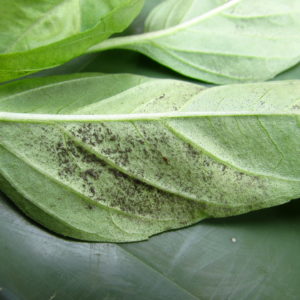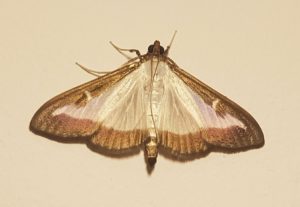Two multi-institutional research studies will soon be underway to analyze the movement and mitigation of invasive pests negatively impacting plants in North America.
The IR-4 Project Environmental Horticulture program is facilitating studies funded by the U.S. Department of Agriculture Animal and Plant Health Inspection Service’s (USDA APHIS) Plant Protection and Quarantine program to mitigate the negative effects of downy mildews and box tree moths.
These studies, totaling $657,700, are made possible through funding for invasive species management in the 2018 Farm Bill. Both projects will begin in late spring or early summer of 2021.
Downy Mildew Study

The goal of the downy mildew study is to improve the detection of downy mildew on basil, impatiens and cucurbits such as cucumber, melon and squash. Downy mildew is destructive to these plants and can result in substantial crop losses.
Researchers will develop Polymerase Chain Reaction (PCR) technology to improve diagnostic tests and examine new mitigation options for this pest, including screening new cultivars bred to be resistant to downy mildew at several locations across the country and testing the use of red light to interrupt the pathogen’s life cycle. The study will lead to refined management recommendations for growers specific to their local geographic conditions.
This multi-institutional project, led by the IR-4 Project at Rutgers University, is a collaboration among researchers at Rutgers University, Cornell University, Michigan State University and NC State University, as well as the USDA Agricultural Research Service.
Box Tree Moth Study

The goal of the box tree moth study is to screen crop protection tools for short-term eradication and long-term management of the pest. Box tree moth larvae cause severe defoliation of boxwood shrubs, which has led to mortality over the course of repeated infestations. The pest also has been reported to infest and damage other common landscape plants, including holly and euonymus.
Several methods will be analyzed including insecticides, softer products, sterile insect technology and improved trapping. The study will also lead to the development of recommendations and visual survey guides for continued management of the box tree moth.
The box tree moth was first reported in North America in 2018 when it was found in Canada. Researchers believe it is spreading. As part of this study, a network will be established to survey, identify and track the arrival of this pest in the United States.
This multi-part project is being led by a team of scientists at USDA APHIS and the IR-4 Project at Rutgers University with collaborators at Cornell University Cooperative Extension of Suffolk County and NC State University, as well as departments of agriculture in Illinois, Michigan, New Jersey, New York, North Carolina, Ohio, Pennsylvania and Tennessee with substantial cooperation with the American Public Garden Association.
About the IR-4 Project
Established in 1963, the mission of the IR-4 Project is to facilitate regulatory approval of sustainable pest management technologies for specialty crops and specialty uses to promote public well-being. To learn more, visit our website at ir4project.org.
